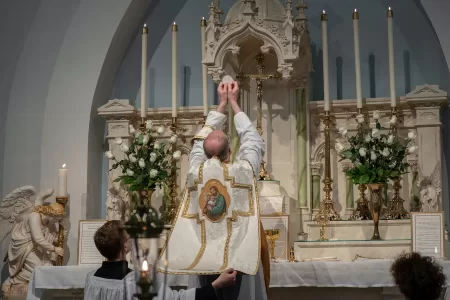Quick Bytes
- Deacon Keith Fournier discusses the importance of attending Mass and the encounter with Jesus.
- Worship in the Catholic Church is foundational to identity and mission, reflecting beliefs and guiding life.
- The Holy Mass is highlighted as the highest form of worship, where heaven and earth converge.
- Pope Benedict XVI’s teachings on liturgy underscore its transformative power on individuals and communities.
Understanding the Significance of Mass in the Catholic Faith
Deacon Keith Fournier shares his personal journey back to the Catholic Church, emphasizing the transformative experience of the Holy Mass. He explains that Mass is not just an obligation but a meeting with Jesus Christ, which should be enough to draw believers to attend. Fournier, a ”revert” to Catholicism, found his way back through a deep hunger for prayer and the discovery of the early Church fathers.
The Role of Worship in Catholic Identity
The article delves into the Latin maxim “Lex Orandi, Lex Credendi,” which suggests that the way we worship reflects our beliefs and shapes our daily lives. Fournier describes the Divine Liturgy, or Holy Mass, as the beating heart of the Christian vocation, a place where heaven touches earth. The Catholic Church’s role in overseeing worship is crucial for preserving the faith and guiding the faithful in living out their Christian mission.
The Impact of Liturgical Worship
Worship is not an optional part of Catholicism but the foundation of its identity, expressing the Church’s highest purpose. Good worship acts as a dynamic means of drawing people into the fullness of life in Jesus Christ. Fournier emphasizes the reciprocal relationship between worship and life, where each informs and transforms the other.
Pope Benedict XVI’s Influence on Liturgy
The article concludes by referencing Pope Benedict XVI’s contributions to the understanding of liturgy. His book “The Spirit of the Liturgy” and his teachings have been influential in seminaries and among Catholics, highlighting the liturgy’s power to inform and transform both individuals and the faith community.
For more in-depth insights, read the full article here.
Image Credits
Photo credit: Shalone Cason
Quick Bytes
- Liturgy is a divine action, not to be altered by individuals or communities.
- The Church is fully experienced in the liturgy, where God’s presence is tangible.
- Catholic theology emphasizes the Church’s role as a mother and teacher through its Precepts.
- The Precepts of the Church provide a moral and spiritual framework for the faithful.
Understanding the Liturgy and Church Precepts
The liturgy, as a central aspect of the Catholic faith, is primarily an act of God rather than a creation of the community or experts. It is through the liturgy that the Church becomes visible and believers can experience a direct encounter with the divine. The liturgy is celebrated for God’s glory, and the faithful are called to participate with openness and guidance from the Church.
In Catholic theology, the Church is likened to a mother and teacher, guiding its followers towards truth, goodness, and beauty. This guidance is encapsulated in the “Precepts of the Church,” which are positive laws established by Church authorities. These Precepts ensure a minimum standard of prayer and moral effort, fostering growth in love for God and neighbor.
The Precepts include attending Mass on Sundays and holy days, confessing sins annually, receiving the Eucharist during the Easter season, observing days of fasting and abstinence, and providing for the Church’s needs. These are not only obligations but also opportunities for spiritual enrichment and community building within the Church.
By adhering to these Precepts, the faithful are encouraged to maintain a moral life that is deeply connected to the liturgical life of the Church, ensuring their spiritual well-being and alignment with the teachings of the Catholic faith.



